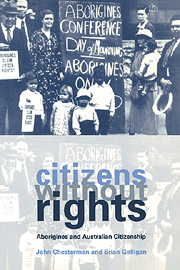Book contents
- Frontmatter
- Contents
- List of Tables
- Acknowledgments
- Abbreviations
- Dedication
- Introduction
- 1 The Citizenship Divide in Colonial Victoria
- 2 Under the Law: Aborigines and Islanders in Colonial Queensland
- 3 Is the Constitution to Blame?
- 4 The Commonwealth Defines the Australian Citizen (in association with Tom Clarke)
- 5 The States Confine the Aboriginal Non-citizen
- 6 The Slow Path to Civil Rights
- 7 From Civil to Indigenous Rights
- Notes
- Bibliography
- Index
7 - From Civil to Indigenous Rights
Published online by Cambridge University Press: 22 August 2009
- Frontmatter
- Contents
- List of Tables
- Acknowledgments
- Abbreviations
- Dedication
- Introduction
- 1 The Citizenship Divide in Colonial Victoria
- 2 Under the Law: Aborigines and Islanders in Colonial Queensland
- 3 Is the Constitution to Blame?
- 4 The Commonwealth Defines the Australian Citizen (in association with Tom Clarke)
- 5 The States Confine the Aboriginal Non-citizen
- 6 The Slow Path to Civil Rights
- 7 From Civil to Indigenous Rights
- Notes
- Bibliography
- Index
Summary
There have been two great themes to our struggle: citizenship rights, the right to be treated the same as other Australians, to receive the same benefits, to be provided with the same level of services; and indigenous rights, the collective rights that are owed to us as distinct peoples and as the original occupiers of this land.
Lois O'Donoghue, chairperson of the Aboriginal and Torres Strait Islander Commission, 1996Since the late 1960s there has been little improvement in the life situations and health of Aborigines. Incarceration rates remain much higher for Aborigines than for non-Aborigines, and poverty affects a much higher percentage of Aborigines than non-Aborigines.
But politically, the period since the late 1960s has witnessed some significant changes in the conception of Aboriginal rights. Indeed the concept of ‘Aboriginal rights’ itself has gained currency in the last quarter century, a fact brought about by the concerted political action of Aborigines. From the 1960s the formal Commonwealth and State restrictions that denied Aborigines any meaningful status as Australian citizens were slowly abandoned. These legislative changes at both levels coincided roughly with the timing of the 1967 referendum, a fact that probably explains why the referendum is accorded the status of citizenship maker.
Legal changes in the period since Aborigines were accorded formal citizenship status have resulted now in the acknowledgment that Aborigines possess certain rights that do not pertain to other Australians.
- Type
- Chapter
- Information
- Citizens without RightsAborigines and Australian Citizenship, pp. 193 - 222Publisher: Cambridge University PressPrint publication year: 1997



